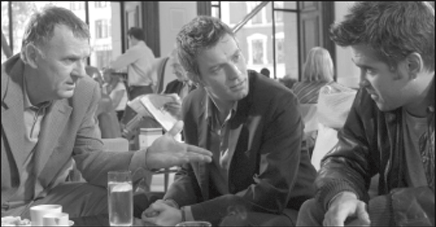By Steven Snyder
Woody Allen returns to form in serious fashion with “Cassandra’s Dream,” a movie named after a sailboat that two brothers buy even though they know they can’t afford it. As they leave the dock in trendy sweaters and designer shades, taking their girlfriends out for a sunny afternoon cruise, Cassandra’s Dream becomes the embodiment of their vanity, their desperation for the better life.
Whatever obsession leads them to buy that boat in the first place is also what gives both Terry (Colin Farrell) and Ian (Ewan McGregor) the mental fortitude — or is it moral bankruptcy? — to commit a heinous crime for a family member, all in exchange for cold, hard cash. Unlike “Match Point,” Allen’s last great dramatic work which was more a murder mystery preoccupied with the fickleness of fate, “Cassandra’s Dream” is a character study of two deeply flawed brothers, made vastly more complicated by the ways in which their moral codes come to resemble sliding scales. “Match Point” was black and white; “Cassandra’s Dream” is all gray.
As much as Allen’s movies have always been preoccupied with an upper crust of liberal elites, “Cassandra’s Dream” is fascinated instead with the full spectrum of class and social status. Terry and Ian are the sons of a broke, married couple, privy to their routine fights over money — mom berating dad for committing his life to the family business, a fledgling restaurant, while the family depends almost solely on rich uncle Howard (Tom Wilkinson) whose regular checks pay the bills.
Terry and Ian are big dreamers who have yet to turn those dreams into reality. Terry works as an auto mechanic by day and gambles away his earnings on cards at night, his mood swinging wildly along with his luck at the tables. One day, he’s up a few thousand and rushing to buy a house with his girlfriend; the next, he’s tens of thousands of dollars in debt, running to his brother in a panic.
Ian is less transparent about his financial fudging, but no less extreme in his duplicity. He works in his dad’s restaurant, but rather than gambling on cards, he gambles all his hopes and dreams on an American hotel project that’s still in the planning stages — a sizeable investment he’s desperately trying to raise the money for.
Everything changes when he meets Angela (Hayley Atwell), an aspiring upper-class actress, one day out in the country. Dressed in his finest clothing, driving a sports car he borrowed from Terry’s shop and posing as a hotel developer, Ian suddenly faces the prospect of marrying an actress and nudging his way into upper society. Yet as he continues to play this wealthy persona, the more his money troubles threaten to swamp him.
Money, and its hold over our happiness, is the central theme of “Cassandra’s Dream,” and in each character we see the notion of greed butting up against his natural desire to be a good and decent person. Terry and Ian’s parents may argue incessantly about money, but in one quick cutaway, as they wash the dishes in the kitchen, we realize that deep down they share an immense love and respect for each other. In their sons, we sense a different evaluation of good and bad underway.
When rich uncle Howard offers Terry an open line of financing if he and his brother aid him with a crime, Terry seems devastated by the line he’s crossed while Ian seems more than able to file it away, chalking it up as a means to an end. Bit by bit, we’re pushed to the brink right along with them — dared first to ponder what we’d be willing to do to get that boat and that money, and then rebuffed with the prospect of just how much guilt we would be able to withstand.
































